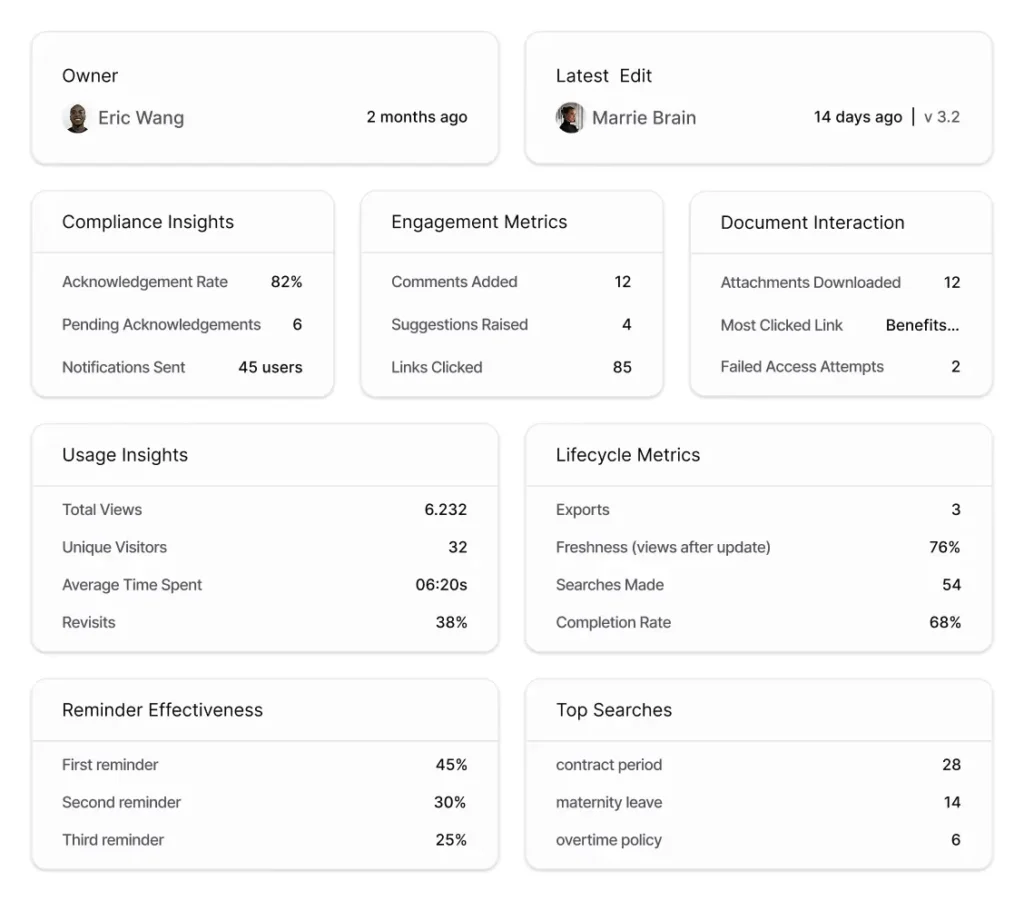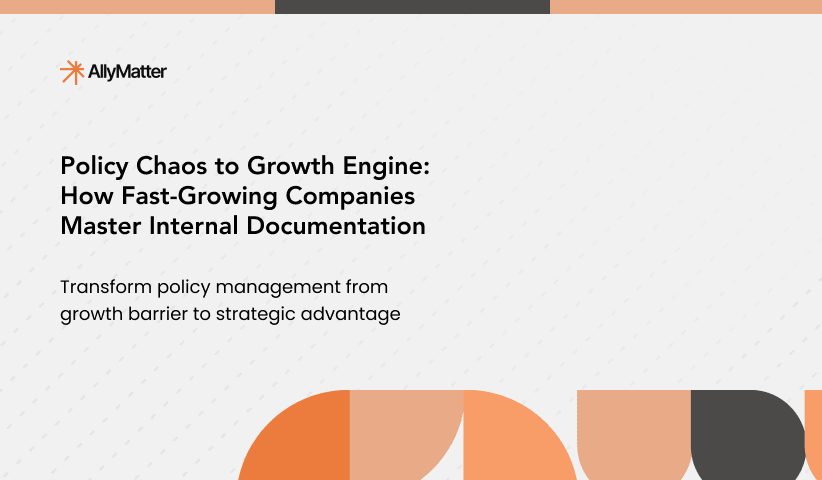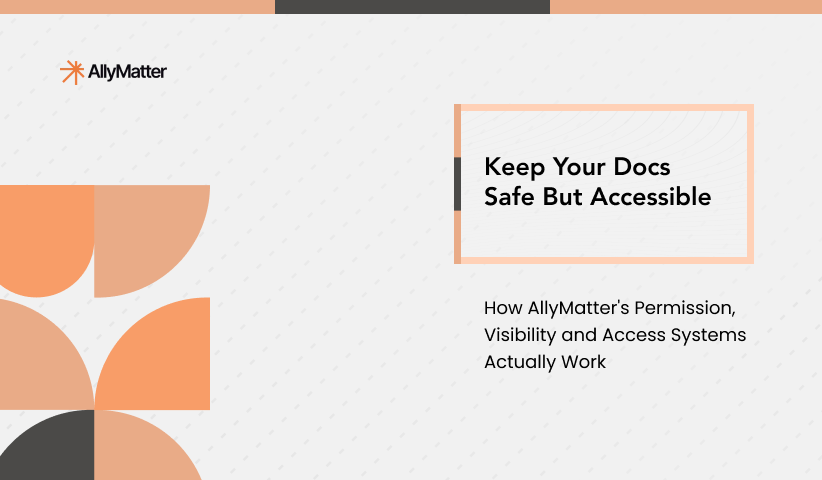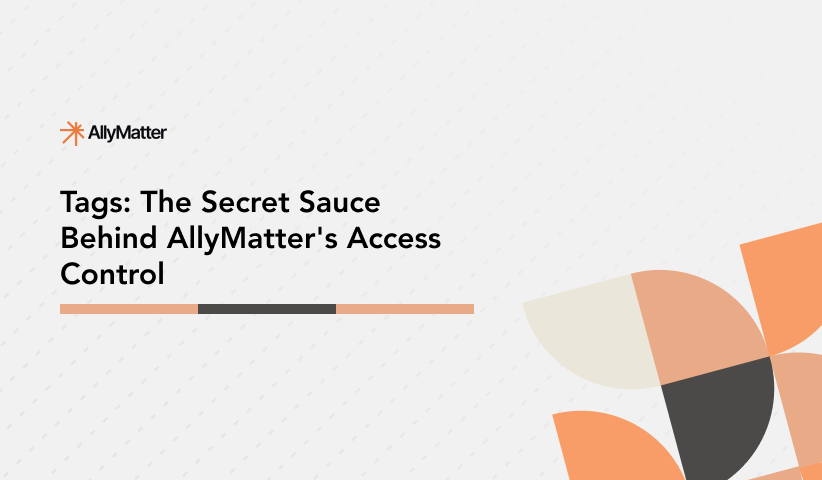Your company receives notice of an unscheduled compliance audit arriving in 48 hours. The auditor needs evidence that all employees acknowledged your updated data security policy from last quarter. Without proper tracking, this triggers an emergency scramble through email threads, chat logs, and hasty employee confirmations.
For organizations using AllyMatter’s knowledge management platform, this scenario transforms from crisis to routine verification. The compliance team simply generates a report showing exactly who reviewed the policy, when they acknowledged it, and through what method, all backed by an immutable audit trail that stands up to regulatory scrutiny.
According to a Gartner survey, 47% of digital workers struggle to find the information needed to effectively perform their jobs, making systematic policy acknowledgment even more critical for organizational clarity.
This article explores how AllyMatter’s acknowledgment tracking creates tangible value for fast-growing companies facing increasing compliance requirements.
The hidden compliance Gap in most organizations
Most growing companies face a troubling documentation reality: policies exist, but evidence of who actually received and acknowledged them doesn’t. The compliance gap typically develops through three common scenarios:
Scenario 1: The “Reply-All” acknowledgment
A new policy announcement arrives via email. Some employees respond confirming they’ve read it. Others read but don’t reply. Some never open the email. When an audit occurs months later, reconstructing who actually acknowledged the policy becomes nearly impossible.
Scenario 2: The “Shared Drive” approach
Policies live in a shared drive or intranet. Employees are instructed to review them, but no systematic method exists to track who accessed what document and when. During compliance verification, the organization cannot prove policy distribution.
Scenario 3: The “Training Session” assumption
Companies conduct policy training sessions and assume attendance equals acknowledgment. Without proper tracking that connects specific policies to specific employees with timestamps and verification, this assumption creates significant exposure.
These scenarios create serious operational and legal vulnerabilities that AllyMatter’s acknowledgment tracking directly addresses.
How allymatter’s acknowledgment tracking works
AllyMatter’s acknowledgment tracking, a core component of the knowledge base ecosystem, connects three critical elements, each designed to match different compliance requirements while maintaining seamless user experience.
The chat notification method delivers policy updates through organizational communication channels. The system sends direct notifications with document links, requiring recipients to click an “Acknowledge and Agree” button after reviewing. The platform records timestamps and user information in its immutable audit log, creating permanent verification records.
The platform-embedded acknowledgment functionality places verification directly within system’s document interface. A prominent “Acknowledge” button appears for required parties, capturing the user’s identity, timestamp, and policy version when clicked. This creates a seamless experience while maintaining robust compliance documentation.
For documents requiring the highest level of verification, AllyMatter’s third-party e-signature* integration provides legally recognized verification. The system tracks signature status and securely stores completed documents with full audit history in AllyMatter’s secure repository, particularly important for regulated industries like healthcare and financial services.
(*This feature is under development.)
Transforming legal and compliance workflows
AllyMatter’s acknowledgment tracking fundamentally changes how organizations manage policy distribution and verification by shifting from reactive to proactive compliance management. Instead of scrambling when audits arrive, teams using AllyMatter maintain continuous visibility into their compliance status.
Real-time dashboards provide immediate visibility into which employees have acknowledged important policies, with automated reminders targeting those who haven’t completed requirements. This identifies compliance gaps before they create exposure during regulatory reviews.

The platform creates defensible evidence through immutable audit trails recording user actions, timestamp verification, and methodology documentation. This evidence provides the foundation for demonstrating due diligence during inquiries or challenges.
For regulated industries like healthcare and financial services, acknowledgment tracking simplifies mandatory reporting requirements. The ability to generate comprehensive compliance reports within minutes rather than weeks represents one of AllyMatter’s most significant operational benefits.
Real-world applications across departments and teams
AllyMatter’s acknowledgment tracking creates value across the organization beyond just compliance teams. Its implementation affects multiple departments with distinct benefits for each.
It enables HR departments to manage policy distribution for code of conduct updates, anti-harassment policies, and benefits enrollment confirmations. Instead of managing spreadsheets, they can identify which employees need follow-up while maintaining complete documentation in the system’s central repository.
For example, Susan, an HR manager at a fast-growing healthcare startup, is preparing for their first HIPAA compliance review. Instead of manually tracking down email confirmations from 200+ employees about updated privacy policies, she can generate a comprehensive report from AllyMatter showing complete acknowledgment history in under five minutes.
IT security improves protection with the platform by ensuring employees acknowledge acceptable use policies and data handling procedures. Formal policy acknowledgment correlates with significantly higher security protocol compliance, making AllyMatter’s tracking a direct contributor to risk reduction.
Finance departments use acknowledgment tracking to confirm understanding of expense approval workflows, procurement policies, and financial authority limits. This creates both operational clarity and audit protection for financial processes within a single unified platform.
Implementation essentials for AllyMatter’s acknowledgment tracking
Growing companies implementing AllyMatter’s acknowledgment tracking should focus on balancing compliance needs with user experience. It provides flexibility to match verification methods with document importance, offering simpler acknowledgment for routine updates and formal verification for critical compliance documents.
The solution integrates seamlessly with existing workflows to increase adoption and compliance rates. When acknowledgment systems align with how employees already work, whether through email notifications, chat alerts, or the AllyMatter platform interface, the friction that typically reduces compliance disappears.
The implementation should follow a structured approach:
- Start with critical compliance policies requiring formal acknowledgment.
- Set up automated reminders for pending acknowledgments.
- Configure role-based access to determine acknowledgment requirements.
- Establish regular reporting schedules for compliance visibility.
With AllyMatter’s flexible reporting capabilities, teams quickly generate filtered reports showing acknowledgment status by department, policy type, date range, or individual employee. This visibility transforms compliance from a reactive to proactive function:
- Before: Policy updates scattered across email, shared drives, and verbal communications with no verification trail.
- After: Centralized policy distribution through AllyMatter with automated acknowledgment tracking and comprehensive audit documentation.
Building a compliance-ready knowledge ecosystem
AllyMatter’s acknowledgment tracking represents one critical component of a broader knowledge management approach. When implemented within AllyMatter’s comprehensive knowledge base, it connects with related systems to create a complete compliance solution.
Its version control feature ensures employees acknowledge the current document version, eliminating outdated policy issues that commonly create compliance gaps. AllyMatter’s access controls determine which policies require which team members’ acknowledgment based on roles and departments, streamlining the verification process.
The reporting systems provide compliance visibility across the organization with real-time metrics that support both operational management and regulatory reporting. The platform’s policy lifecycle management tracks acknowledgment through document updates with clear status indicators.
Together, these AllyMatter capabilities create a continuous compliance ecosystem rather than a reactive document management approach, addressing the core challenges that typically plague growing organizations.
AllyMatter transforms compliance from burden to asset
AllyMatter’s acknowledgment tracking transforms compliance from administrative burden to strategic asset. Organizations using AllyMatter gain reduced legal exposure through consistent policy distribution and verification. Operational efficiency improves by eliminating manual tracking processes that typically consume significant administrative resources.
Audit readiness increases dramatically with AllyMatter’s on-demand compliance reporting capabilities. Enhanced accountability develops through clear acknowledgment expectations and verification. Onboarding simplifies as new employees automatically receive and acknowledge policies through AllyMatter’s structured workflows.
These benefits extend beyond mere compliance, creating organizational clarity around critical knowledge assets and supporting broader operational excellence initiatives through AllyMatter’s integrated approach.
Building compliance confidence
Effective policy management requires more than writing good documentation. It demands systematic distribution, acknowledgment tracking, and verification. AllyMatter’s structured acknowledgment processes transform policy compliance from uncertainty to confidence.
For growing companies facing increasing regulatory scrutiny, the platform with robust acknowledgment tracking provides both legal protection and operational clarity. When the next unscheduled audit arrives, the response becomes a simple report generation rather than a company-wide emergency.
Ready to transform your compliance processes? Join our waitlist to be among the first to experience AllyMatter’s comprehensive knowledge management platform with built-in acknowledgment tracking.
Frequently asked questions
What’s the difference between document access tracking and AllyMatter’s acknowledgment tracking?
Access tracking simply records when a user viewed a document, while AllyMatter’s acknowledgment tracking captures the user’s explicit confirmation that they understand and agree to follow the document’s content. AllyMatter’s acknowledgment tracking creates significantly stronger compliance evidence for regulatory purposes.
Do all company policies require formal acknowledgment tracking in AllyMatter?
No. Organizations using AllyMatter should implement tiered approaches where critical policies (security, legal compliance, safety) use formal acknowledgment tracking, while informational documents may require only access tracking or no verification. AllyMatter supports this flexible approach.
How does AllyMatter’s acknowledgment tracking support remote workforces?
Remote work environments eliminate traditional in-person policy communication. AllyMatter’s digital acknowledgment tracking creates consistent verification regardless of employee location, ensuring distributed teams maintain compliance awareness.
What makes AllyMatter’s acknowledgment records legally defensible?
AllyMatter’s defensible records include user identification verification, accurate timestamps, immutable audit trails, clear policy version control, and appropriate methodology based on document importance.
How often should employees re-acknowledge existing policies in AllyMatter?
Best practices suggest annual re-acknowledgment for critical policies, even without content changes. When significant updates occur, immediate re-acknowledgment should be required regardless of the previous acknowledgment timeline. AllyMatter supports scheduled re-acknowledgment workflows.
How does AllyMatter handle acknowledgment tracking during employee transitions?
AllyMatter automatically tracks acknowledgment status through role changes and departures. When employees change positions, the system identifies new policy requirements and triggers appropriate acknowledgment workflows. For departing employees, the solution maintains permanent records of their policy acknowledgments for compliance documentation.


